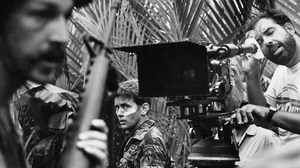Francis Ford Coppola (1972-1982)

Francis Ford Coppola’s astonishing initial creative period represents one of the most brilliant runs in the history of cinema. In just a decade, Coppola delivered five films that redefined Hollywood’s artistic boundaries while tackling themes of power, morality, family, and human frailty. As one of the central figures of the New Hollywood movement, Coppola married his deeply personal storytelling instincts with a grand operatic style, creating works that were both intimate and epic. This period also showcases the duality of Coppola’s genius: while his ambition led to breathtaking masterpieces, it occasionally spiraled into excess. From his unparalleled achievements with The Godfather films to the experimental collapse of One from the Heart, Coppola’s decade was as much about artistic triumph as it was about the risks that would later threaten his career.
The Godfather (1972) Coppola’s The Godfather wasn’t merely a film—it was a phenomenon. Transforming Mario Puzo’s crime novel into a sweeping narrative about family, loyalty, and the corrosive nature of power, Coppola brought an unprecedented level of artistry to the gangster genre. With Marlon Brando’s iconic turn as Vito Corleone and Al Pacino’s revelatory performance as Michael, the film elevated every aspect of its source material. Nino Rota’s mournful score and Gordon Willis’s shadow-heavy cinematography gave the film a timeless, almost mythic quality. Its juxtaposition of the Corleone family’s internal tenderness with their external brutality made it a profound exploration of the American Dream turned nightmare. Its slow pacing and meticulous construction challenged audiences of the time, with some critics initially dismissing it as overly indulgent. Decades later, The Godfather is hailed as one of the greatest films ever made, an unparalleled cultural touchstone that forever altered the course of American cinema.
The Conversation (1974) Following The Godfather, Coppola took a sharp turn with The Conversation, a paranoid thriller that reflected the disillusionment of the 1970s. This introspective film centers on Harry Caul, a surveillance expert (played with masterful restraint by Gene Hackman), who becomes consumed by guilt and paranoia when he suspects his recordings might lead to murder. Unlike the sprawling narrative of The Godfather, The Conversation is spare and restrained, relying on atmosphere and subtext to build its tension. Walter Murch’s groundbreaking sound design places the audience squarely in Harry’s fractured psyche, with every snippet of conversation carrying ominous weight. Unrelentingly cold and deliberate, its thematic resonance with the political scandals of the era gives the film a haunting immediacy—a masterpiece of minimalist storytelling and a sobering reflection on the ethics of technology and surveillance.
The Godfather Part II (1974) With The Godfather Part II, Coppola accomplished the unthinkable: he expanded and deepened the narrative of the original, creating what may be the greatest sequel of all time. By juxtaposing Michael Corleone’s chilling consolidation of power with flashbacks to Vito Corleone’s rise, the film explores the cyclical nature of power, corruption, and familial loyalty. At over three hours, the film’s structure demands patience, but it rewards viewers with its rich character studies and moral complexity. Al Pacino delivers one of cinema’s most haunting performances, portraying Michael as a man trapped by his own ambition, while Robert De Niro’s nuanced portrayal of young Vito adds layers of depth to the Corleone saga. Though the debate continues whether it surpasses its predecessor, Part II has since been canonized as a masterpiece that cemented Coppola’s place in cinematic history.
Apocalypse Now (1979) Few films encapsulate the madness of their creation like Apocalypse Now. A loose adaptation of Joseph Conrad’s Heart of Darkness set during the Vietnam War, the film follows Captain Willard (Martin Sheen) on a mission to terminate the rogue Colonel Kurtz (Marlon Brando). Coppola famously described the production as his own descent into madness, with delays, budget overruns, and a typhoon adding to the chaos. Despite—or perhaps because of—its troubled production, the film achieves a hallucinatory brilliance. Coppola’s operatic approach to the horrors of war, combined with unforgettable visuals like the surreal “Ride of the Valkyries” helicopter attack, create a film that feels like a fever dream. While its nonlinear structure, ambiguous ending, and Brando’s performance as Kurtz remain divisive, the film’s thematic weight and audacious scope make it a singular achievement, enduring as a profound meditation on war, morality, and the fragility of the human psyche.
One from the Heart (1982) After a decade of artistic triumphs, Coppola’s One from the Heart marked a dramatic shift in tone and execution. This romantic musical, shot entirely on meticulously constructed soundstages, tells the story of a couple navigating the ups and downs of love in a hyper-stylized, neon-drenched Las Vegas. Coppola envisioned the film as a technical marvel, blending innovative visuals with a theatrical aesthetic. While undeniably ambitious, One from the Heart falls short of its lofty goals. The story lacks the emotional depth of Coppola’s previous work, and the lavish production design, while visually stunning, often overwhelms the narrative. The film’s financial failure bankrupted Coppola’s Zoetrope Studios, signaling the end of his golden era. However, it remains a fascinating, if flawed, testament to his willingness to push creative boundaries, even at great personal cost.
Overall Appraisal From 1972 to 1982, Francis Ford Coppola delivered a body of work that stands as one of the most remarkable achievements in cinematic history. His films during this period are defined by their thematic ambition, technical innovation, and profound emotional resonance. The Godfather films redefined the crime genre, while The Conversation and Apocalypse Now explore the darker corners of human existence with unparalleled depth. Even his misstep, One from the Heart, underscores his fearless artistic vision. Coppola’s ambition often walked a fine line between genius and excess, leading to uneven pacing or indulgent storytelling, and the financial repercussions of his grandiose visions would haunt him in the years to come. Despite these flaws, Coppola’s contributions during this era solidify his legacy as one of the greatest filmmakers of all time, a visionary whose work continues to inspire and challenge audiences and filmmakers alike.
